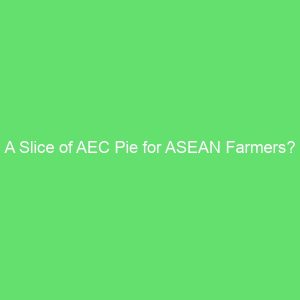It started quite clumsy as no one really knew each other when they arrived at Kasetsart University (KU) Home Hotel on 27 March 2016. But toward the end of the study tour, the ASEAN Learning Route on Agricultural Cooperatives (ALRAC) has successfully forged friendships, solidarity and most importantly, a common understanding among ASEAN farmers and government officials on what needs to be done for ASEAN farmers to be able to relish a slice of the ASEAN Economic Community (AEC) Pie.
Thirty (30) participants from eight ASEAN countries representing farmers’ organisations and government agencies took part in the 7-day study tour which kicked-off in Bangkok, Thailand and concluded in Manila, the Philippines. The purpose of ALRAC was quite straightforward. It aimed to prepare and empower the ASEAN smallholder farmers and rural producers to benefit from the recently launched ASEAN Economic Community (AEC) through strengthening the roles of agricultural cooperatives. Despite its long process of coming into existence, many people in the region particularly those in the rural areas remain unaware and uninformed what AEC is and what prospects and challenges it brings about. This is one of the topics that the ASEAN Farmers’ Organisations Support Programme (AFOSP) – an EU and IFAD grant multi-stakeholders project – tried to tackle in organising the ASEAN Learning Route on Agricultural Cooperatives, which was a joint effort with PROCASUR Asia-Pacific.
“In ASEAN, there are a lot of diversities in the formation of agricultural cooperatives. Thailand has its own version, Malaysia has another version and so as the other countries in the region,” Ms. Norlizah binti Muhamad, the representative of the Chair ASWGAC (ASEAN Sectoral Working Group on Agricultural Cooperatives) pointed out this fact in her opening remarks. Such mixtures are also evident and prevalent at national level. “The situation of agricultural cooperatives in Thailand varies in every regions and many of them are not as advanced as Khao Kitchakood,” added Mr. Panuwat Na Nakornpanom, the ASWGAC member from Thailand. Based on this reality, there has been a call for ASEAN to consider and design a comprehensive roadmap or blueprint on agricultural cooperatives as a guidance to harmonise the different state and progress of agricultural cooperatives in the region.
The compact learning sessions were tailored to highlight the achievements of Thailand and the Philippines in their continued efforts to mobilise their agricultural cooperatives as a means to empower and enhance market access for their farmers and to ensure food security. Participants were exposed not only to the respective national legal frameworks, current state of agricultural sector, cooperative systems and good management practices, but also to the existing public private initiatives and various supports for smallholder farmers. These classroom sessions were complemented by field visits to prominent and successful agricultural cooperatives such as Khao Kitchakood Agricultural Cooperative in Chanthaburi, Thailand and Sorosoro Ibaba Development Cooperative (SIDC) in Batangas, the Philippines. In those field visits, participants were given the rare opportunity to see and observe directly how these best practice cooperative models being run and operated, and get insights of their good agricultural practices (GAP) and innovative plans to anticipate the imminent AEC waves.
In many aspects, ALRAC was a unique study tour. It was not only a grassroots level event, but also served as a venue where for the first time, ASEAN farmers and government officials sat together on the same table to learn, to reflect, to consider and to design an innovation plan to forestall the potential impacts of AEC. As put forward by Mr. Eko Yudi Sukrianto from the Indonesian Peasant Alliance: “Sometimes I think I am in a dream that I am here participating in this study tour. Never had I thought that I will be in the same room with the other ASEAN farmers to share and discuss our common concerns”.
The learning route is now over and all participants have safely returned to their home. However, a looming task remains. In order to be fully prepared and ready for AEC, ASEAN farmers need to reflect on what they have learned during the study tour and assess if their current agricultural practice is adequate for AEC challenges. It is therefore premature to say that ASEAN smallholder farmers will benefit from AEC as the onward journey is still far ahead. Through the ASEAN Learning Route, AFOSP has just taken its first baby steps. Hopefully, with a strengthened role of agricultural cooperatives, all ASEAN farmers will be part of the AEC celebration and get a generous slice of that scrumptious AEC pie.
SOURCE: http://aseanfoundation.org/news/a-slice-of-aec-pie-for-asean-farmers

Comments are closed